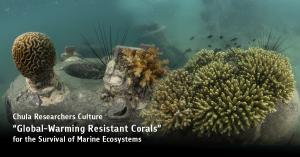Chula Researchers Culture 'Global-Warming Resistant Corals' for the Survival of Marine Ecosystems
BANGKOK, THAILAND, May 27, 2025 /EINPresswire.com/ -- Researchers at Chulalongkorn University’s Aquatic Resources Research Institute have developed innovative methods to help corals adapt to global warming. Through artificial insemination and raising corals in high-temperature environments from birth, they aim to cultivate corals capable of withstanding rising sea temperatures. In addition, they have introduced cryopreservation techniques to store coral sperm cells for future restoration.
Global warming, pollution, and human activities such as tourism and fishing have led to the widespread degradation of coral reefs. Scientists warn that if current trends continue, over 90% of global corals may become extinct within 30 years, threatening marine biodiversity and the global food chain.
Professor Dr. Suchana Chavanich, Marine Science Department, Faculty of Science, Chulalongkorn University, Deputy Director of the Aquatic Resources Research Institute, Chulalongkorn University, and Deputy Director of Chula Unisearch, and her team have been conducting coral breeding research since 2005. They found that corals raised in warmer water conditions (32-34 °C”) since birth adapt better to global warming. These corals, called “Corals Against Global Warming,” have shown promising survival and reproductive rates after being released into the sea.
Corals naturally reproduce sexually and asexually, but these methods are slow and increasingly unreliable due to climate change. The team developed artificial insemination techniques, collecting coral eggs and sperm during full-moon spawning events. The fertilized embryos are raised on terra cotta bricks in nurseries for two years and then reintroduced into the ocean to grow for another three years. These corals are ready to spawn at age five, significantly improving survival rates.
However, this method is costly, with each coral embryo costing around USD 100 compared to USD 1 for the coral fragmentation technique. Despite the cost, the high resilience to bleaching makes the investment worthwhile.
To further ensure the survival of coral species, the team collaborated with Taiwanese scientists to apply cryogenic technology. Coral sperm has been successfully frozen for future use, while egg freezing is still being developed. This approach could allow for coral revival when ocean conditions improve.
Prof. Dr. Suchana emphasizes that coral conservation must be a collective effort involving reef restoration, pollution reduction, public awareness, and sustained funding. With coordinated action, the revival and long-term survival of coral ecosystems is still possible.
Read the full article at https://www.chula.ac.th/en/highlight/236355/
Chula Communication Center
Chulalongkorn University
Pataraporn.r@chula.ac.th
Legal Disclaimer:
EIN Presswire provides this news content "as is" without warranty of any kind. We do not accept any responsibility or liability for the accuracy, content, images, videos, licenses, completeness, legality, or reliability of the information contained in this article. If you have any complaints or copyright issues related to this article, kindly contact the author above.
Transforming the Beauty Industry: Mini Packaging for Cosmetics and Personal Care Poised to Thrive with Robust Growth
Moongate Films Launches to Bring East Asian Stories to Global Screens
Modular Kitchen Baskets Market to Reach USD 1.8 Billion by 2035, Driven by Customization and Efficient Storage Demand.
Więcej ważnych informacji
 Jedynka Newserii
Jedynka Newserii

 Jedynka Newserii
Jedynka Newserii

Ochrona środowiska

A. Bryłka (Konfederacja): Ograniczenie emisyjności nie musi się odbywać za pomocą celów klimatycznych. Są absurdalne, nierealne i niszczące europejską gospodarkę
W lipcu br. Komisja Europejska ogłosiła propozycję nowego celu klimatycznego, który zakłada ograniczenie emisji gazów cieplarnianych o 90 proc. do 2040 roku w porównaniu do stanu z 1990 roku. Został on zaproponowany bez zgody państw członkowskich, w przeciwieństwie do poprzednich celów na 2030 i 2050 rok. Polscy europarlamentarzyści uważają ochronę środowiska i zmiany w jej zakresie za potrzebne, jednak nie powinny się odbywać za pomocą nieosiągalnych celów klimatycznych.
Polityka
Dramatyczna sytuacja ludności w Strefie Gazy. Pilnie potrzebna dobrze zorganizowana pomoc humanitarna

Według danych organizacji Nutrition Cluster w Strefie Gazy w lipcu br. u prawie 12 tys. dzieci poniżej piątego roku życia stwierdzono ostre niedożywienie. To najwyższa miesięczna liczba odnotowana do tej pory. Mimo zniesienia całkowitej blokady Strefy Gazy sytuacja w dalszym ciągu jest dramatyczna, a z każdym dniem się pogarsza. Przedstawiciele Polskiej Akcji Humanitarnej uważają, że potrzebna jest natychmiastowa pomoc, która musi być dostosowana do aktualnych potrzeb poszkodowanych i wsparta przez stronę izraelską.
Polityka
Wśród Polaków rośnie zainteresowanie produktami emerytalnymi. Coraz chętniej wpłacają oszczędności na konta IKE i IKZE

Wzrosła liczba osób, które oszczędzają na cele emerytalne, jak również wartość zgromadzonych środków. Liczba uczestników systemu emerytalnego wyniosła w 2024 roku ponad 20,8 mln osób, a wartość aktywów – 307,5 mld zł – wynika z najnowszych danych Urzędu Komisji Nadzoru Finansowego (UKNF). Wyraźny wzrost odnotowano w przypadku rachunków IKE i IKZE, na których korzyść działają m.in. zachęty podatkowe. Wpłacane na nie oszczędności są inwestowane, a tym samym wspierają gospodarkę i mogą przynosić atrakcyjną stopę zwrotu.
Partner serwisu
Szkolenia

Akademia Newserii
Akademia Newserii to projekt, w ramach którego najlepsi polscy dziennikarze biznesowi, giełdowi oraz lifestylowi, a także szkoleniowcy z wieloletnim doświadczeniem dzielą się swoją wiedzą nt. pracy z mediami.









.gif)

 |
| |
| |
|